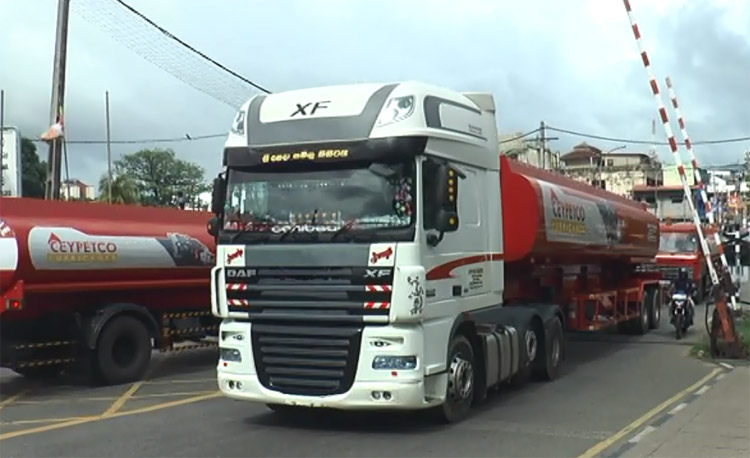May, 26, 2022

The lower levels of the Sri Lankan social pyramid are prone towards conflicts but are resilient as per many researches done over the decades. Since 1948 they energized conflicts triggered by a few with political (and hidden financial) agendas and underwent countless hardships due their own shortsighted acts and personality worshiping. The present financial crisis due to mismanagement of economy by such elected by the lower levels has created shortages resulting in “Polims”. As per various definitions the synonym of queue (Polima) is a; line, file, string, cavalcade, row, column, chain or a stream etc. of persons/ vehicles waiting for their turn. It can also be interpreted as a procession, succession, train, progression, sequence, series, a waiting list or even a reserve list depending on the circumstances. When conflicts escalate resulting in deaths, surviving will go in a funeral procession to lay the dead to rest. Similarly the locomotive is often referred to as a train as the carriages move in a line pulled by the engine. In SL till 1980s fossil fuel was mainly distributed to the regions by train (Ref rail stats). In the mid 1990s the Lorry community was rewarded and using the train was gradually reduced. May be the Lorry community was used to fund the political activity. Some believe that the lower level of the pyramid came up with the election slogan “father for the country and Bowser (tanker) son for western province” with that move as the father was handing petroleum in the cabinet.
The Queue
A queue is referred to as below in respective languages; Pankti - Hindi (Song dhanno budunge referes to “Seru pankti pankti”), Tabur – Arabic, Fila – Portuguese, Katara – Punjabi, Foleni - Swahili and Sira – Turkish. Especially the lower levels and most in mid levels in SL at present are uncertain about surviving the next day, week or month. At the Nugegoda curd (fuel) queue it reflected clearly on their faces. A proper analysis would indicate same in all parts of the country. People may not be aware that “Sira” and “Katara” means a queue in Turkish and Punjabi but the average citizen on the queue were serious and knew they are lost in a failed state. Citizens realizing past mistakes is a positive sign towards resolving the conflict as the community will act as individuals to change course. That will take the country out of the crisis as in most case studies (ref post 1945 Japan and post 1949 China). Still the struggling should remember that there are individuals who would rob, run away with empty LP gas cylinders or sell mixed fuel at black market prices to make an extra buck in the crisis. Similar acts are being committed at higher levels in large scale in most failed states. Some of them are in the African continent.
Resilient Citizens
Swahili is a language used in many east African countries including Uganda. Swahili is also referred to as “Kiswahili”. The estimated number of Swahili speakers is approx. 200 million (Ref EAC stats). In Swahili a line of people or vehicles waiting for fuel (petrol) is known as a “Petroli Foleni”. Resilient individuals or communities (Ref. academic definitions) are those who can recoil or bounce back after difficulties or external pressure that may have affected their usual life styles. It was very encouraging to see quite a number of resilient citizens in the good hearted curd “Petroli Foleni” in Nugegoda. Observing their patience and creativity for nearly 24 hours waiting at one point till the tanker arrived was a never before opportunity. They used the air conditioning of nearby shopping complexes to beat the heat. One purchased a new shirt as what he wore was drenched with sweat. A tuk driver encouraged to give the dirty shirt to the nearby laundry as he was confident that the shirt can be washed by the time Petroli arrived. It indicated that they had the patience to wait even a day. Another wanted a foot massage at the high end spar near the Foleni but couldn’t as he only had the money to buy fuel and a snack to beat hunger. When the good hearted delayed the fuel tanker the public politely told them that they will never damage the pumps but will eat all the curd, sweetmeats and the rice on sale to survive another day waiting for Petroli. The resilient pumpers called the Police and the Police called the Army. After waiting for nearly 24 hours a tanker arrived and the cheering crowd asked if it’s actually Petroli or Buffalo curd in it. Fortunately it was Petroli. Those who waited for nearly 24 hours in Foleni went home with mostly full tanks. Some they say were resilient to go back to the Foleni after selling what was pumped for a higher price to those who could afford. This development should make the people realize the value of; using fuel efficient vehicles, renewable energy and planning transport to save money. If SL manages energy needs its people can be more independent in the region. They can focus more on attempts to fail the state. Protecting the state for future generations is a tougher task than chasing away a bird or two.
(The writer is an Academic and a Broadcaster. Views expressed are personal and may not necessarily be the views of his affiliations.)
Video Story